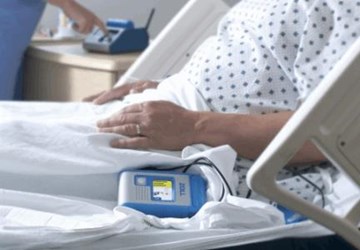Zoll In-Hospital Wearable Defibrillator Gains FDA Approval

Zoll Medical, a Japanese medtech specializing in acute critical care, has received FDA approval to begin U.S. distribution of its hospital wearable defibrillator (HWD), a device that can detect life-threatening arrhythmias in hospitalized patients and automatically deliver a shock to the chest. The HWD technology is similar to the company’s LifeVest, which was approved for pediatric home use in 2015.
The most common causes of sudden cardiac arrest (SCA) are ventricular fibrillation (VF) and ventricular tachycardia (VT), abnormally rapid or irregular heart rhythms. CPR or defibrillation by electrical shock can restore regular heart rhythms in patients suffering SCA, but every minute is critical. According to the National Heart, Lung, and Blood Institute (NHLBI), chances of survival are reduced by 10 percent for every minute defibrillation is delayed.
For the last three decades, some patients at high risk for VT or VF have been prescribed an implantable cardioverter-defibrillator (ICD) to increase their chances of survival following a cardiac event. Implanted devices, however, carry their own risk and are only suitable for patients diagnosed with permanent risk. Authors of a study in Circulation point out that wearable cardioverter-defibrillators (WCD) could be especially useful for patients undergoing diagnostic workups.
The American Heart Association (AHA) published a science advisory last year in response to increased adoption of WCDs, and reviewed existing clinical support for the technology’s safety and efficacy relative to the patient’s diagnosis. Despite some risks, the AHA concluded that WCDs “can serve as temporary means of aborting arrhythmic death in patients with transient risk of SCD or those with indications for ICD implantation who have a transient barrier to permanent implantation.”
Zoll Medical, currently the market leader in wearable external defibrillators, first received approval for its LifeVest in 2002, indicated for patients at risk for VT/VF but unsuitable for an implantable device. Subsequent models were approved in 2006 and 2009. In 2015, the LifeVest was approved by the FDA for pediatric use based on a study of 248 patients, aged three to 17, in which no additional safety concerns were identified.
According to clinical studies cited by the firm in a press release, LifeVest technology has demonstrated a 98 percent success rate with its first shock and a 92 percent survival rate among wearers. The HWD uses the same detection algorithm and defibrillation waveform as the Zoll technology currently marketed for home use, and was designed to monitor hospitalized patients day and night, and to provide immediate treatment in response to detected malignant arrhythmias.
Jonathan Rennert, CEO of Zoll, noted in a press release that HWD complements hospital equipment that currently in place to respond to SCA by offering “continuous protection, even outside of very expensive, high-acuity care areas.”
In 2015, Zoll acquired Kyma Medical Technologies, a medtech based in Tel Aviv that specializes in remote monitoring technologies capable of measuring early signs of congestive heart failure. Jason Whiting, President of Zoll, noted at the time that the acquisition would allow the company to broaden its portfolio and R&D capabilities.
